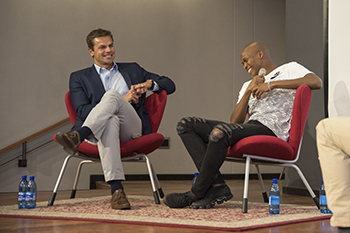Latest News Archive
Please select Category, Year, and then Month to display items
12 October 2020
|
Story Dr Cindé Greyling
|
Photo Supplied
 Exercise and nutrition can work wonders for your mental health – you don’t even have to ‘feel like’ or ‘enjoy’ moving around and eating well for it to work – it does its thing anyway.
Exercise and nutrition can work wonders for your mental health – you don’t even have to ‘feel like’ or ‘enjoy’ moving around and eating well for it to work – it does its thing anyway.
Nowadays, people talk about mental health like it is the common cold – which is good! But do you know what it really means? Being mentally healthy does not only refer to the absence of a mental illness but includes your emotional and social well-being. One would almost want to add physical well-being too, since a healthy body does indeed support a healthy mind. However, since so many people consider themselves ‘mental health experts’, some myths have been sold as truths.
Myth #1 – You are doomed.
Nope. Never. You are never doomed. There is always help. Mental-health therapies range from self-help, talk therapy, medication, to hospitalisation in some cases. Somewhere on this spectrum of treatments, there will be something that works for you. But you must be willing to get the help and do the work. For starters, exercise and nutrition can work wonders – you do not even have to ‘feel like’ or ‘enjoy’ moving around and eating well for it to work – it does its thing anyway.
Myth #2 – It won’t affect you.
It may. Research suggests that one in five people may suffer from a mental illness at some point in their lives. Being well now does not mean that it will stay that way. Biological and environmental factors both impact your mental health. Hopefully not, but at some point, you may experience an event that affects your mental health.
To remain integrated in a community is always beneficial
for anyone suffering from a mental or physical condition.
Myth #3 – Someone struggling with mental health must be left alone.
Hardly! To remain integrated in a community is always beneficial for anyone suffering from a mental or physical condition. You do not need to fix them, but to remain a friend. Continue to invite them, even if they decline. Do not judge, and do not try to understand. Just stay around.
Go and be kind to yourself, and to those around you.
Luvo and Ryk inspire UFS student leaders
2017-10-13

Ryk Neethling and Luvo Manyonga have a special bond.
The sporting duo shared their inspiring stories with student
Leaders of the University of the Free State.
Photo: Kaleidoscope Studios
Dreams can come true and Luvo Manyonga’s story is the perfect example. It would make the ideal movie script. This is opinion of the businessman and former international swimmer Ryk Neethling.
The Olympic gold medallist and former World Champion and Manyonga shared their stories with new student leaders of the University of the Free State (UFS).
“I am so proud of this guy,” Neethling said. “And we are just half-way through this movie. The best is yet to come.” The 26-year-old Manyonga is the current Olympic silver medallist and World Champion in long jump. But he had to overcome huge obstacles as a former tik or crystal meth addict.
Not an easy road
The duo were guests for a session, Inspirational Stories of Lived Humanising Experiences, which was part of the university’s Student Leadership Training weekend for Student Representative Councils, Residence committees, Residence Assistants and Association Representatives in the Economic and Management Sciences Auditorium on the Bloemfontein Campus.
Manyonga, who is dating the Kovsie netball player Khomotso Mamburu, talked about growing up in Mbekweni township in Paarl, about his career and his setbacks.
After finishing fifth at the IAAF World Championships in Daegu, South Korea, in 2011 he started partying when he returned home. “I hooked up with the wrong friends and they introduced me to tik,” he said. “They told me: ‘Hey dude, you are drunk. Just take a hit and it will sober you up.’ I took it and it was nice, but that is where it started.”
Be surrounded by positive people
Manyonga lost all his money and his sport was also suffering because of his addiction. “At the beginning of 2014 I started to realise that I was throwing my life away and I needed help. I went to reach out to people close to me and told them I had a problem.” He thanked Neethling, who helped him when he was at his lowest, his mother, the South African Sports Confederation and Olympic Committee, Tuks Sport and the High Performance Centre where he trains for the influence on his life.
Neethling’s advice to student leaders was to dream big, work hard, expand your network and find a mentor you can learn from.
“Always surround yourself with positive people,” he said. “You can succeed if you stay positive.”